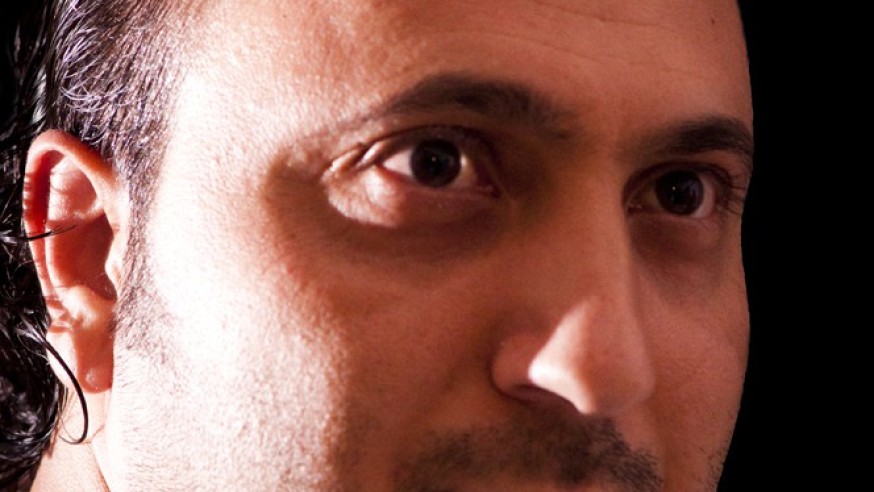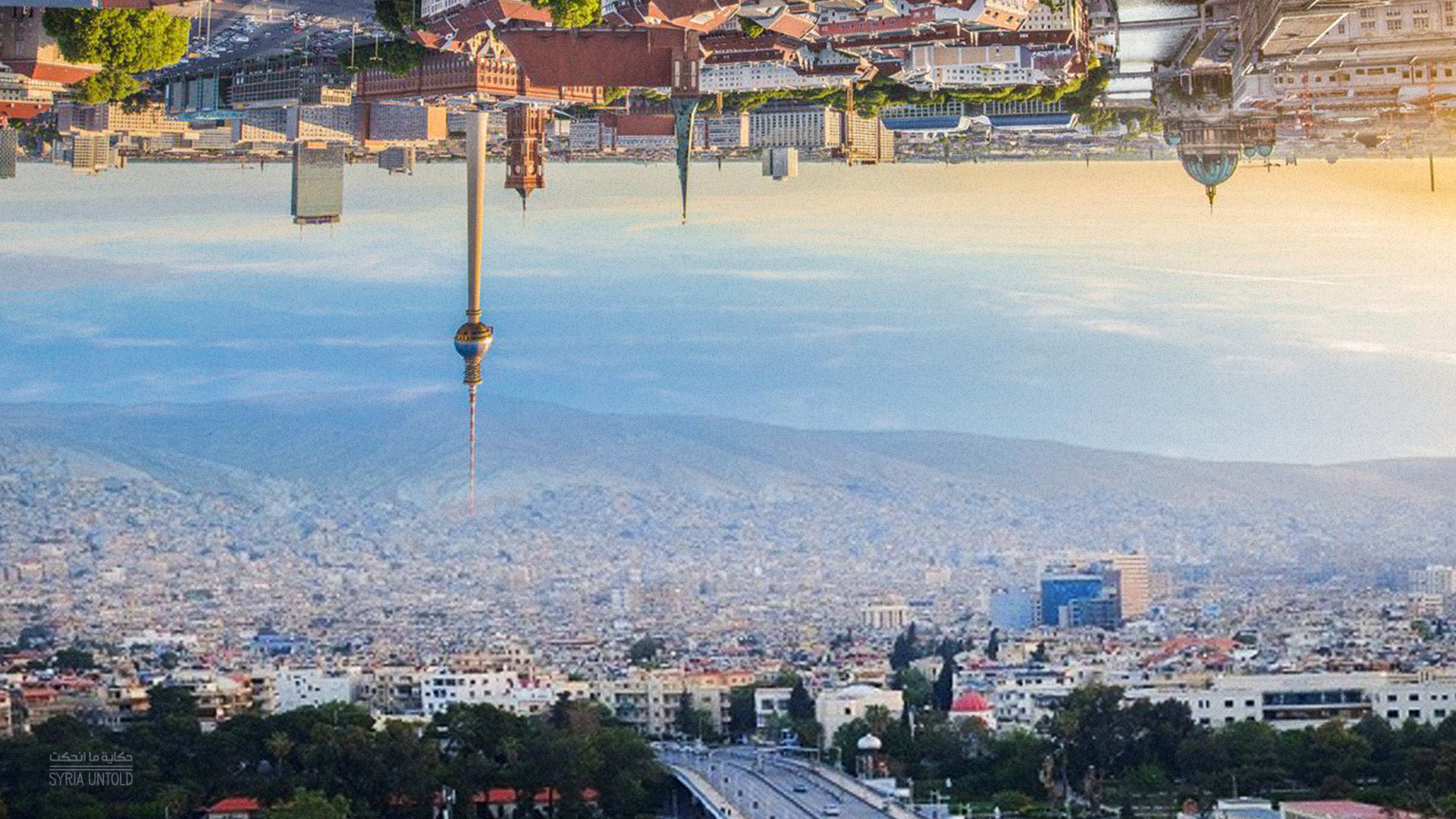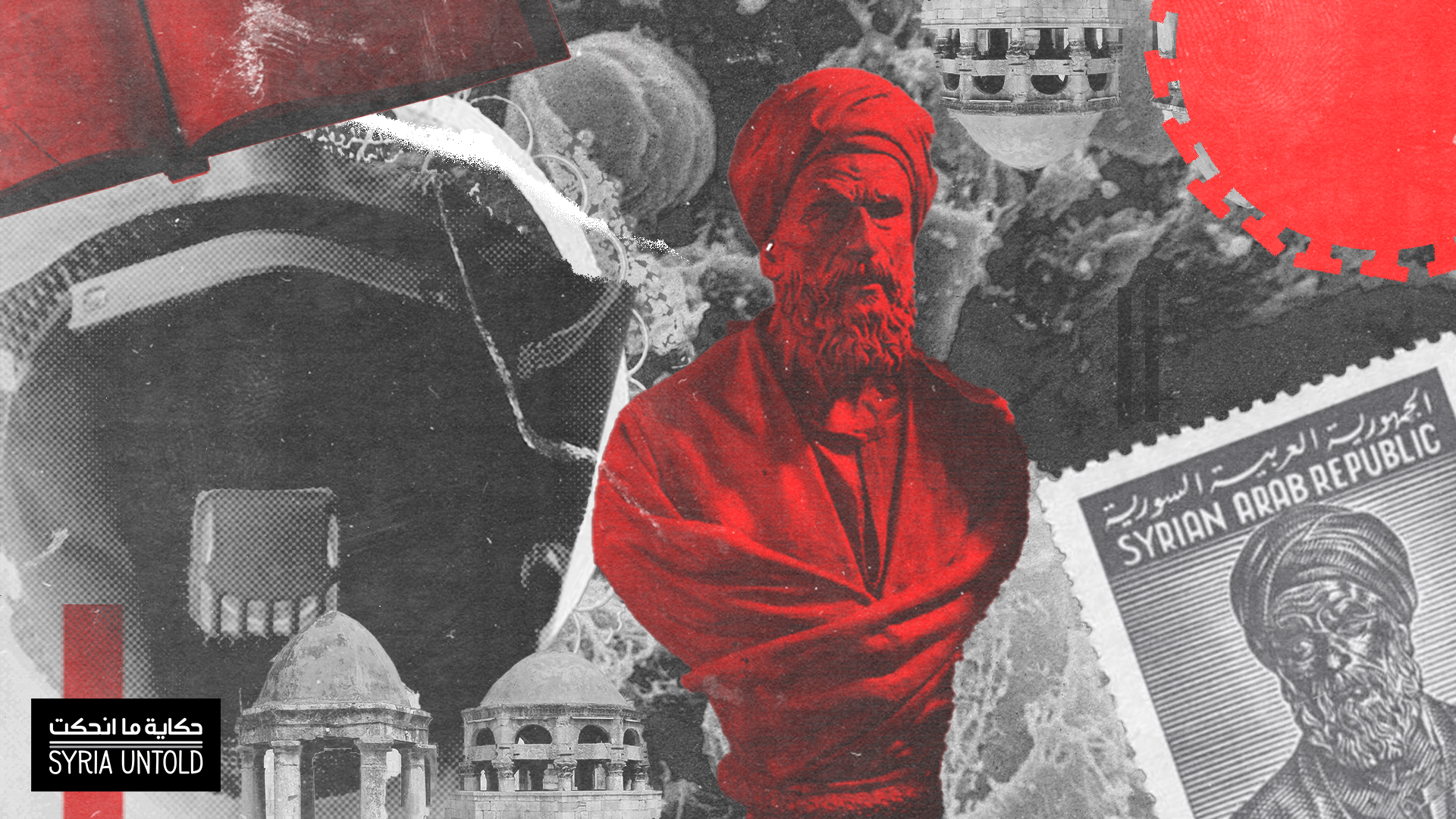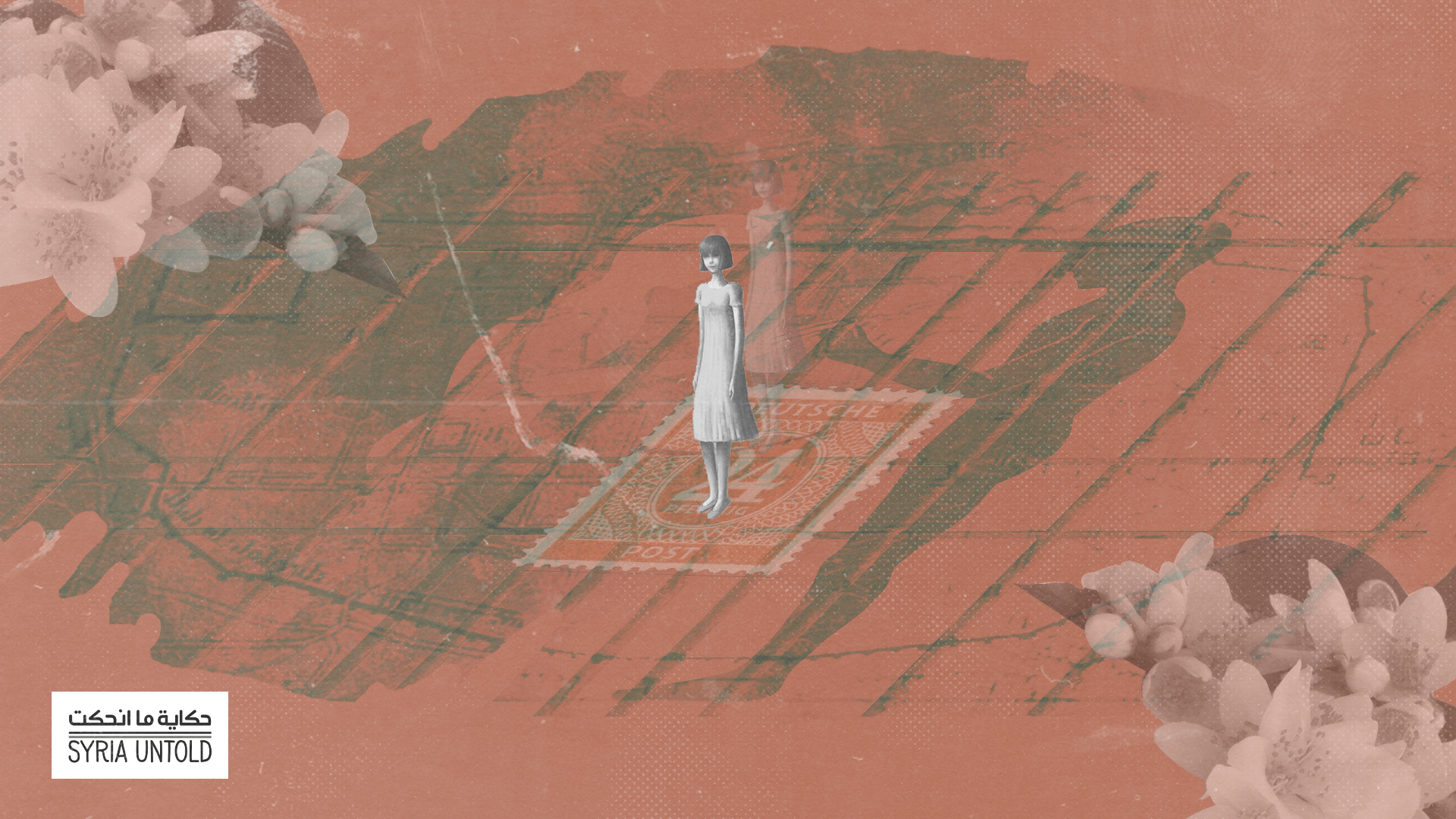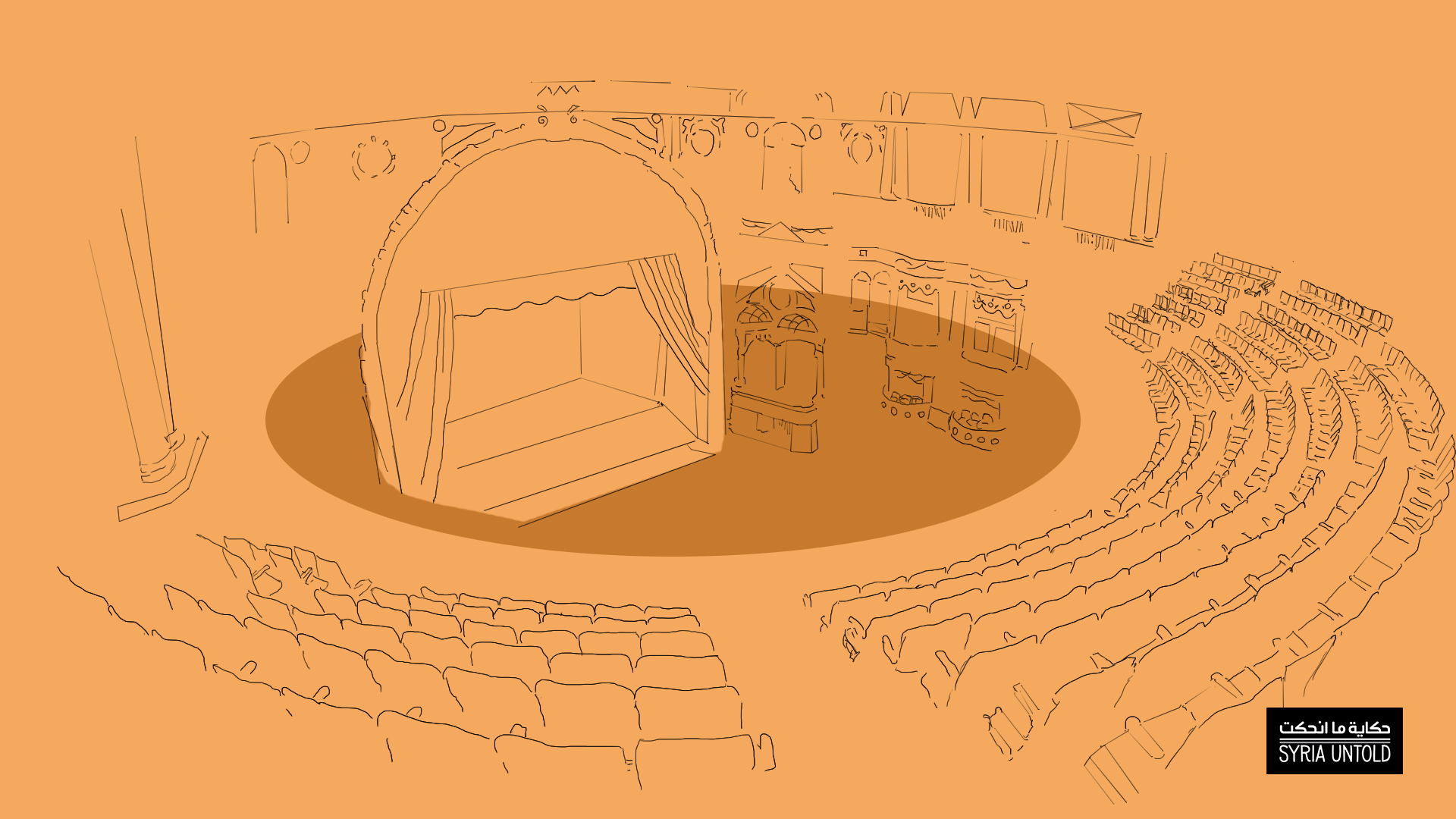Read this essay in its original Arabic here.
When I first arrived in Berlin, a Syrian who had been in exile for a long time told me: “I live downtown, in the middle of Berlin.”
After a while, I’d come to pay attention to these little phrases, repeated on the tongues of many Syrians. Most of them don’t live downtown in the sense that they mean. This discrepancy made me aware early on of these phrases, released by people’s consciousness though subconsciously reflecting other repressed, hidden meanings.
“I live downtown, in the middle of Damascus.”
This is something Syrians used to say to one another before they left Syria, to denote a certain social class. To live “downtown” means that you live in Bab Touma, al-Qasaa, al-Salehiyeh or Mezzeh, that you are well-off, even if that isn’t actually the case—so long as you are wealthy in the popular imagination. And if you lived in Abu Rummaneh, you’re definitely wealthy. But if you lived in Tishreen, Qaboun, Ish al-Warwar or Ain Tarma, or any of the informally built neighborhoods and distant suburbs (as I did) you belong to the poor and marginalized. Every time you move from one home to another, you determine your social class both in your own eyes and in the eyes of others. In Syria, this place is not just the building where you live—it is a house, a family, a sort of belonging. It is the signifier of your class and standing in society, a guide for how others should see you and treat you.
From Damascus’ al-Rawda cafe to Berlin’s Einstein cafe, a heartbeat
28 August 2020
Returning to Abu Alaa al-Maari in our year of plague
13 May 2021
I think something along these lines happens everywhere in the world. My partner and I live in the Charlottenburg area of Berlin. We were surprised at how people often reacted to this information, opening their mouths: “Oh, you live there?” In the minds of many Germans, Charlottenburg is a rich, affluent area, though in reality most residents are longtime tenants, paying cheap fixed rents. With time, part of the neighborhood has indeed become home to the rich, with a few middle and low income residents as well. Still, this reality hasn’t changed the neighborhood’s reputation as a wealthy one.
I think when those of us in exile say the phrase “I live in the middle of Berlin,” we're searching for someplace, something to compensate for what we have lost. We are trying to prove ourselves to others, or perhaps to make up for a deficiency we feel inside ourselves, one that can be seen not in this phrase alone, but in many other phrases and contexts as well. And yet we continue saying it with confidence, without realizing the deeper meanings hinting at our internal struggles, our alienation, our lack of stability in any one fixed location.
“These days all I see are Germans and foreigners,” many Syrians tell me repeatedly when I ask them, “Who are you seeing these days?” When I think about the meaning and the structure of their answer, I feel the scope of their alienation and their need to feel confident, stable and self-sufficient. It is natural, when someone asks us who we’re seeing lately, to answer, “I’m seeing so-and-so and I talked with so-and-so.” But when we say, “Honestly, the only people I’m seeing are Germans and foreigners,” it’s like an attempt to put ourselves in another place entirely from our peers, companions or neighbors.
As for why they need to seek out these feelings, perhaps the answer lies with Freud and his followers. There is a need to promote self-affirmation amid integration into a new society, and perhaps a condescension towards the society they came from. This is perhaps what is being repeated here by those saying such phrases, namely, an expression of superiority thrown around by words or certain behaviors that indicate someone’s place or new position, things that only serve to show the extent of the contradictions and conflicts working away at the subconscious of those living in exile.
Between ‘We became Germans’ and ‘Syrian-Germans’
When two of us meet again after a long time apart, one of us always says to the other: “How long has it been? God, we became Germans without even noticing” (this is something the author of this article has said himself). There is an idea fixed in the subconscious minds of Syrians and exiles that Germans only make appointments with friends after three or four months apart. Perhaps this phrase also holds some other reference to Germany’s difficult bureaucracy.
As soon as friends sit down and start talking, the differences between life in Germany and in Syria become the focus of their conversations.
But saying to someone that “we’ve become Germans” doesn’t mean here any sort of real integration. Rather, it’s a way to mock the situation we’re in, one that doesn’t allow friends to meet naturally without previously drawn-up plans. This is quite unlike what we used to do in Syria, where it was enough for a friend to ring your doorbell with no prior warning (it would be rude to turn down their request to enter). And if you wanted to be a bit more polite, perhaps you could call beforehand to tell your friend, “I’m on the way!” or “Meet me at the cafe in half an hour.”
This type of intimacy and comfort with which we used to meet friends has been lost by Syrians in exile, replaced with a pathological nostalgia. Now we don't know what we really want.
As soon as friends sit down and start talking, the differences between life in Germany and in Syria become the focus of their conversations. Soon, the sarcasm and mockery begin (including the person who always says, “God, we became Germans”). We discuss our customs in Syria, such as the lack of respect for appointment times, and how relatives and friends visit without asking first. Then, after a few minutes, we move to mocking the German way of life, which pulled us into its corridors and made us into Germans against our will. And then a few more minutes go by and we return to the topic of having seen “only Germans and foreigners” these days.
Afterwards, when I return home, I try to solve and explain away this web of puzzles—not with the aim of punishing its participants, but rather to attempt an understanding of it and of myself. Can I understand my own transformations? Are there symptoms of exile that I don’t even recognize, and do I carry some of these inconsistencies within myself? Are all these things healthy and normal, or do they indicate a crisis of alienation in our new place? We are stuck in a nowhere place. We aren’t really over there, and we aren’t here either, struggling to find any satisfactory formula to solve the problem of our roots. We don’t understand what to do with these roots and what we want from them in the first place.
And suddenly, in conversations, we find ourselves talking about the need to hold onto identity and roots, to teach children the language of their mothers and fathers. Then, with a passion and excitement that is not without condescension towards those around us: “God, in another year, I’ll apply for citizenship. I’m done with permanent residency.”
The body, between event and memory
25 January 2021
Walking a tightrope: Syrian theater in Germany
21 June 2021
We try and understand how to find a line connecting the two things. And yet, as soon as we see the outlines of a thread that justifies these contradictions to us, we destroy it all and say: “As soon as I get citizenship, I’ll leave this country.” And when we hear the question, “Will you return to Syria,” we answer, “Absolutely not. I’ll choose a different country, one with life, with sun.” We try to unravel this tangled ball of string. How can we cling to our roots all while flaunting that we took our nationality and fled to a third place?
My friend Omar calls me from Paris, an anchor to survive the storm of questions. But before I can crack a smile, he asks me: “How are you doing, German?” When I turn his question over in my mind and think of how I’ll respond, he shouts,
“Where did you go?”
“I was thinking of calling you a Frenchman,” I respond.
“You Alawites, aren’t you all originally Germans anyway?” Omar asks me, laughing.
“German” has a second meaning here, as Omar and I (both of us atheists) had our own way of mocking each other’s sectarian roots back when we were living in Damascus. He always used to poke fun at me, saying, “You’re all Germans.” At first, I didn’t understand exactly what he meant by this, so after a few times I asked him.
“You really don’t know?” he responded. As it turns out, some Syrians refer to Alawites by calling them Germans. So if two friends want to talk about a third person, or alert someone sitting with them that there is an Alawite joining the group that day, they say all these things secretly by calling him a “German.” That way, the others in the group will be careful while speaking. This kind of coded speech is performed between other religious sects in Syria, too.
This issue brings us directly to talk of Syrians in Germany and the West in general, to the racism that they face because of the color of their skin or because of their religions. There is precious little talk of this topic, as most them also rarely discuss the racism they themselves practice against others. Rarely discussed are the prejudices that still hold sway over us when we interact with one another. Many of these people complain of the racism practiced against them, while freely expressing disgust towards LGBTIQ people, or against marriage between different religious sects and nationalities. They classify people according to their material situations, sects and political stances and treat those whom they see as lower on the ladder of humanity with racism, especially those with dark skin. There are many strange contradictions, though these are just some of the ones I have seen myself.
Less than half of a second
These contradictions and revelations can be discovered in the little details that occur in less than half of a second amid the flow of daily life. I often see LGBTIQ couples lovingly holding hands in public, and I look at the people around them. Most people show kindness in their faces upon seeing such couples, but then as soon as they pass by, in less than half of a second, you can see in their expressions how they truly feel. Some show a sort of disgust, shaking their heads, while others remain smiling in satisfaction or acceptance.
Riding the U-Bahn, I also watch people’s faces and reactions to things (he who observes people dies, as the Arab proverb goes). I’ve become convinced that people’s innate, initial reactions reflect their true positions on a given issue.
We aren’t really over there, and we aren’t here either, struggling to find any satisfactory formula to solve the problem of our roots. We don’t understand what to do with these roots and what we want from them in the first place.
I often notice when two people accidentally bump into each other, and one of them immediately turns to say “entschuldigung,” or “excuse me,” and then looks at the face of the one who hit him. This one split second reveals the true stance of the speaker towards the stranger they are apologizing to in that moment. If the apologizer is foreign, then they look to see if the person they are apologizing to is foreign like them, in which case they turn away as if they regret saying sorry. On the other hand, if the one receiving the apology is clearly German or white, they seem to deserve an “excuse me.” And when the apologizer is white, they turn away quickly if the person they bumped into appears foreign, while their look is completely different when directed towards another white person.
Is everyone like this? Of course not, but from what I’ve seen the exceptions are few and far between. They constitute a minority that we must work to expand in order to achieve a world that is a little less ugly, racist and dominated by stereotypes of others.
As for the contradictions contained within those living in exile, the refugees, perhaps they can be a door to begin contemplating the crises of displacement, refuge, identity, alienation, placelessness. If these lines refer to the racism that Syrian refugees are subjected to, they also point toward the racism and prejudice that they themselves carry towards others. We must work in both directions, to change the prejudice we face while also breaking down and changing our own prejudiced views towards ourselves and others.


